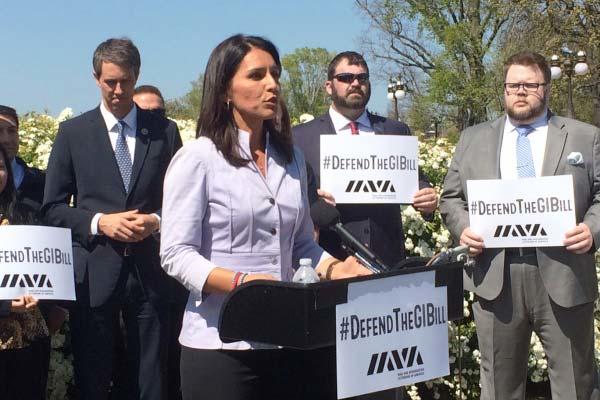Several Democrat lawmakers joined with veterans outside the U.S. Capitol on Thursday to oppose a House bill that will reduce a benefit included in the Post-9/11 GI Bill, calling the education benefit a sacred promise that should not be reneged on just because some now say it is too costly.
Rep. Tammy Duckworth of Illinois, a veteran who lost both legs when the UH-60 Blackhawk helicopter she was piloting was shot down over Iraq, said no one would accept a soldier changing his mind on the battlefield, saying "you know what? Now that the bullets are flying the costs are a little bit high. I'm not gonna go.'
"So how dare we decide, years later after we've made this promise [in the GI Bill] -- after people enlisted or stayed in the military simply because of this benefit -- that it's too expensive, it costs us too much?" she said.
The event, held outside of the House side of the Capitol, was organized by the Iraq and Afghanistan Veterans of America, with support from other groups, including the Vietnam Veterans of America, Air Force Sergeants Association, Association of the U.S. Navy, Commissioned Officers Association of the U.S. Public Health Service, and the Military Order of the Purple Heart.
Paul Rieckhoff, founder and chief executive officer of IAVA, said the omnibus veterans' bill that includes the GI Bill does include other important veteran programs. But he said they're being funded by the money taken from veterans who have already earned the GI Bill and all of its benefits.
Rieckhoff said IAVA would oppose the entire budget "unless they remove this cut.
"Find the money somewhere else," he said. "If you asked the American public to hold a bake sale to fund [the new programs] they would do it, but don't hide it in the omnibus and try to skirt that responsibility."
Among the new programs in the bill are improvements to postnatal care for female veterans, expanded K-9 therapy for veterans suffering with post-traumatic stress disorder, the reauthorization of the VA work-study program, removal of the cap on VA home loan guarantees.
The programs would be funded by the reductions to the GI Bill that the Congressional Research Service estimated would total about $775 million over 10 years.
The benefit targeted in the veterans' legislation is a monthly housing allowance granted to children of veterans attending college on the parent's GI Bill. The bill would halve the value of the housing benefit for children. The transfer perk was designed in part to encourage troops to remain in the military beyond certain points in their careers.
The Basic Allowance for Housing (BAH) benefit is based on an E-5 with dependents for the ZIP code of the school being attended. The amount is adjusted every January to keep pace with inflation and varies by region.
For example, an E-5 with family in San Francisco gets $4,116 a month, a similar family in Wilkes-Barre/Scranton, Pennsylvania, receives $1,374 a month -- the median value -- and a similar family at Columbus Air Force Base in Mississippi receives $819 a month.
Some are justifying the reduction in the housing allowance benefit because the money saved will go toward new or expanded veterans programs, and also because the housing allowance was developed with the veteran in mind -- someone older and possibly with a dependent -- not a son or daughter who would likely live in a dorm.
Lawmakers who joined with Iraq and Afghanistan Veterans of America and other veterans groups on the Hill rejected those arguments.
Rep. Tim Walz of Minnesota said some called the bill overly generous.
"But we didn't ask the veteran when they went [overseas] where their children were going to go to school, and tell them … you can't go to school in New York City, to a New York university" because it costs too much, he said.
Walz said he would vote against the entire omnibus bill, even though it has many needed programs, before seeing it pass with any cuts to the GI Bill.
While the congressman noted that the Congress has worked in a bipartisan manner over the years to provide for veterans, there was no escaping the fact that the half-dozen colleagues standing with him were all Democrats.
"I'm not questioning their [Republicans] commitment to veterans and I'm not questioning that they want to get this right," Walz said. "I think they've been put in a position because of the unbending budget fiasco around here. They were asked to find the money [for the new programs] specifically in [the veterans' budget] and I think most of them do not want to do that."
The lawmakers who took part in the rally have signed a pledge put out by the IAVA stating they would fight to keep the GI Bill intact.
One of those, Rep. Seth Moulton of Massachusetts, a former Marine infantry officer who served four tours in Iraq, said "the same loyalty we expect of our troops is the loyalty we ought to exercise here in Congress.
"That's why I signed this pledge -- as someone who went to school on the Post-9/11 GI Bill, someone who counted on those benefits being there when I got out and went to school myself," he said.
Rep. Tulsi Gabbard of Hawaii, also an Iraq War veteran, said the pledge "is a challenge from us as veterans, as members of Congress, to the country and to our colleagues, to defend the GI Bill, to stand up and speak out for our veterans, to stand up and speak out for those who sacrificed so much, to say don't you dare take these benefits away."
-- Bryant Jordan can be reached at Bryant.jordan@military.com. Follow him on Twitter at @BryantJordan.





















